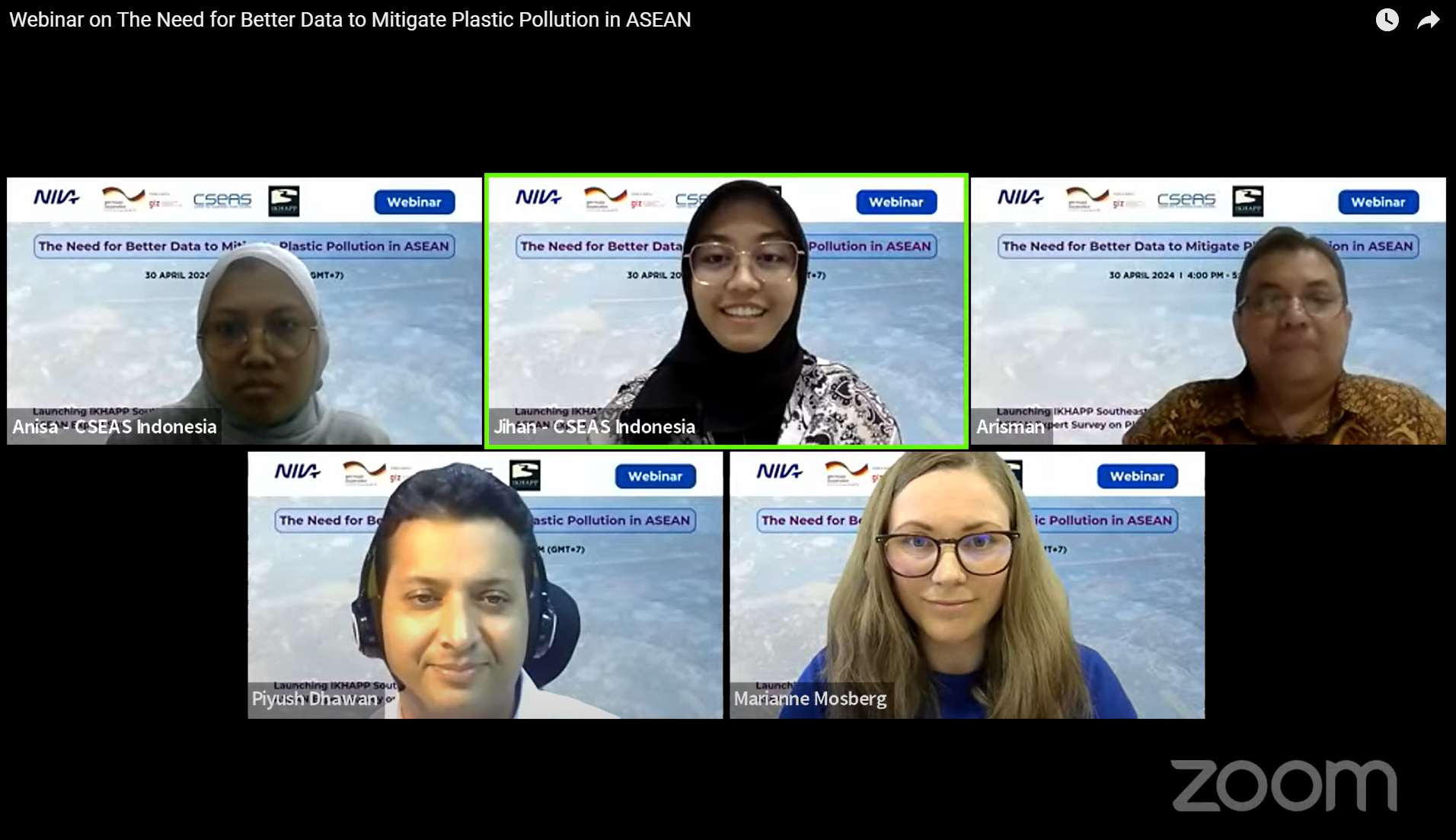Update – Webinar on The Need for Better Data to Mitigate Plastic Pollution in ASEAN
Launch of the IKHAPP Southeast Asia Office and ASEAN Experts Survey on Plastic Waste Management
The Center for Southeast Asian Studies (CSEAS) and the Norwegian Institute for Water Research (NIVA) with the support of the IKHAPP and GIZ organized a webinar on “The Need for Better Data to Mitigate Plastic Pollution in ASEAN” and Launching IKHAPP Southeast Asia Office & ASEAN Experts Survey on Plastic Waste Management on April 30th, 2024. The event attracted more than 90 participants from ASEAN, including representation from international organizations, government bodies, academia and the private sector. The session led to key discussions and questions on the need for better data for improved plastic waste management.
The webinar introduced the Survey for ASEAN Experts on plastic waste management and launched IKHAPP’s Southeast Asia Office, providing a platform for regional collaboration, knowledge exchange, and capacity building in ASEAN. It consisted of presentations from Dr. Arisman, Executive Director, CSEAS Indonesia, Piyush Dhawan, Principal Advisor and Project Director, GIZ for ASEAN-German Project on Reduce, Reuse and Recycle to Protect Coral Reef and Marine Environment (3RproMar) and Marianne Mosberg, Researcher, Section for International Environment and Development, NIVA. The session was moderated by Jihan Khairun Amala, Program Manager, CSEAS Indonesia.
Watch the recording if you missed the live session here.
Background
Plastics, a double-edged sword, brings a host of environmental issues as various types of plastic products do facilitate our life. Plastic wastes have been proven to threaten the health of many organisms including microbes, plants, and animals. Meanwhile, plastics would also cause effects of aerosol radiative forcing as well as the carbon cycle. The key to switching plastics from good to bad is whether they are properly disposed of or discarded into the environment including land, river, and ocean.
However, the process and the amount of plastic wastes entering the environment, especially the ocean, remains unclear. In recent years, alarming images of extensive floating plastic islands and marine debris clusters, such as the Great Pacific Garbage Patch, have heightened global awareness of oceanic plastic pollution. This has motivated various initiatives aimed at identifying the origins of this waste, a crucial step towards implementing effective solutions to this rapidly increasing problem. While different models have been proposed to categorize different countries, contributions to oceanic plastic waste, such as the influential ranking by Jambeck et al. (2015), these models are essentially based on estimates and may not accurately mirror reality. Although Jambeck et al. (2015) has made attempts to estimate the amount of plastic waste entering the environment discharged by all coastal countries around the world, the real amount of mismanaged plastic waste and ocean plastic waste produced by different countries is still unknown. In the previous study, it was found that current models overestimated or underestimated different countries’ contribution to mismanaged plastic wastes and ocean plastic wastes, and large uncertainties exist in these models based on the selection of parameters used.
To shed light on the existing uncertainties surrounding plastic waste mismanagement estimates, IKHAPP has designed a survey to gather insights from experts in the waste management sector. These informed estimates can significantly enhance our understanding of waste mismanagement and the origins of plastic pollution in the ASEAN region and beyond. The knowledge derived from the survey will be instrumental in identifying more effective strategies for managing plastic waste and mitigating its environmental impact.
